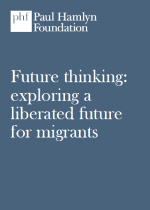Scottish Government commits to continue funding for unaccompanied asylum seekers
The Scottish government announced today that it will be supporting the Scottish Guardianship Service for young unaccompanied asylum seekers, continuing a scheme set up with joint PHF, lottery and government funding in September 2010.
The Scottish Refugee Council, working with the children’s charity Aberlour, developed a guardianship service for children and young people who were arriving in Scotland alone and having to negotiate the complex asylum and immigration system without support. The service allocates guardians to young people to help them through the process and make informed decisions about their future.
Interviewed for a PHF Open Grant case study in 2011/12, Clare Tudor from the Scottish Refugee Council said: “We make this very complicated, legalistic process as smooth and child-friendly as possible. If agencies need to be challenged over their provision, then the guardians will do that. The young people actively partake, at their own pace, and always know what is happening.”
The service was established as a pilot in September 2010, originally to run for 30 months, with funding including £150,000 from the PHF Social Justice programme. The government funding announced today, confirmed at £200,000 for 2012/13 and agreed in principle for a further two years, will see the service sustained beyond its initial time span and continuing to provide appropriate support for young people going through a highly challenging process.
The PHF Social Justice programme has a long-standing interest in children and young people caught up in the asylum and immigration system. An early Special Initiative, the Refugee and Asylum-Seeker Fund, worked with refugee community organisations to build capacity and support practice developments to help young asylum seekers and refugees to integrate into their new communities. The programme later commissioned research on the lived experiences of young undocumented migrants in England – published as the ‘No Right to Dream’ report in 2009. This was followed by the Supported Options Initiative, which is currently working with organisations to find better ways to provide information and support to children and young people living without documentation in the UK.
The Social Justice programme has also supported a range of organisations working innovatively in this area through its Open Grants scheme, including the Legal Services Agency in Glasgow. Working closely with the SRC, they have taken on test cases to seek improvements to some of the ways young people are dealt with in the asylum and migration system.


